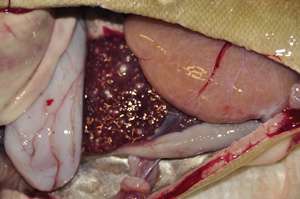Cod's mysterious defence strategies

There may be entirely new vaccines in the offing for the aquaculture industry, if Monica Hongrø Solbakken can figure out cod's unconventional ways of resisting infection.
Low prices for wild-caught cod have kept cod farming profits minimal up to now. The additional challenges of expensive feeds, destructive diseases and high mortality have also proven difficult to solve. On the disease front, Norwegian researchers showed in 2011 that the cod immune system is very unlike that of other production fish such as salmon.
Cod have no subgroup of T-cells, for instance, the white blood cells which in other higher animals are essential for producing the specific antibodies needed by the immune system to remember invading pathogens. Cod, in other words, do not employ the same defence mechanisms that scientists have successfully exploited in vaccine programmes for salmon.
Despite the cod's apparently incomplete immune system, however, it manages to ward off many diseases well. Ms Solbakken is focusing on the cod's unique immune system in her doctoral work at the University of Oslo.
"I am looking to find out whether cod employ alternative strategies in fighting off disease," summarises Ms Solbakken, who is employed by the Centre for Ecological and Evolutionary Synthesis (CEES) at the University of Oslo.
Checking immune system response
Together with Marit Seppola and Helene Mikkelsen, both from the Norwegian Institute of Food, Fisheries and Aquaculture Research (Nofima) in Tromsø, she is investigating how the cod immune system responds to the bacterial diseases francisellosis and vibriosis, both of which are problematic in cod farming. Vaccinating farmed cod against vibriosis has been shown to boost protection.
"It's fascinating to find out more about whether and how vaccination may affect cod," says Ms Solbakken, "since they lack the usual key components of the adaptive immune system that enable the body to customise its defence against diseases."
Finding ways to prevent disease
Ms Solbakken's work will shed light on the mechanisms underlying cod's resistance to disease. This knowledge will be valuable to the aquaculture industry in the future, among other things in helping to find new ways to prevent disease.
"If the conclusion is that cod cannot be vaccinated, then we need to implement other preventive measures and treatments," she explains. "At worst this could mean that cod production will remain difficult due to the high risk of infection from wild fish and bacteria found naturally in the ocean. The best case scenario is that cod will turn out to have an alternative system we can make use of in developing new, effective vaccines."
Provided by The Research Council of Norway


















